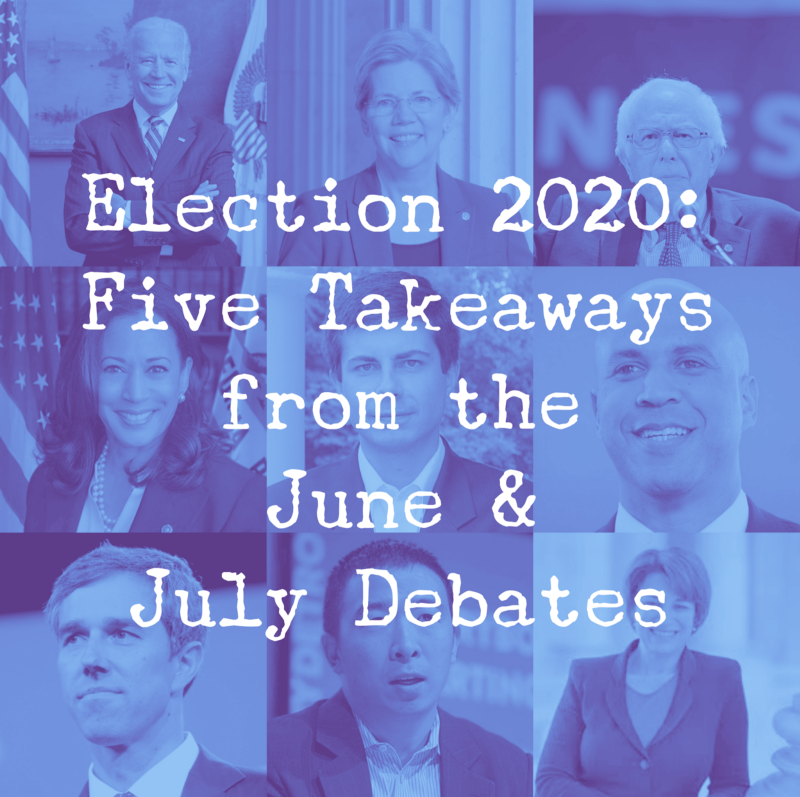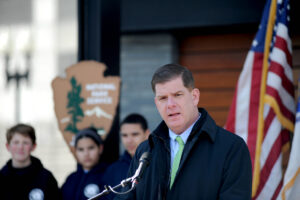Election 2020: Five Takeaways from the June & July Debates

Over the last two months, we have witnessed four nights of debates from 21 Democratic candidates vying for the party’s 2020 nomination. Of the candidates who’ve taken the stage, twelve are current or former members of Congress (seven U.S. Senators, five U.S. Representatives), five are state or local executives (three governors, two mayors), and two are former Obama administration officials (one HUD secretary and vice president, respectively). The field also includes a best-selling author and an entrepreneur.
I previously broke down the candidates’ positions and vulnerabilities going into the June 26, June 27, July 30, and July 31 debates. After these four nights, here are my biggest takeaways.
1) They were a complete circus
I’ve gone back and forth on the pros and cons of the NBC and CNN debates, but they were both a complete mess in hindsight. NBC had myriad technical issues, moderators couldn’t keep control of the candidates, and there were literal hand-raising questions. While CNN had more substantive debates over policy positions, many of their questions were aimed directly at popular candidates, they intentionally stoked up drama between debaters, and too many people got to respond to attacks in succession. I attribute a lot of this to the qualifications being loose, which twice allowed 20 candidates to take the stage across two nights each month.
2) September will see a culling
While 21 candidates have made the debate stage last quarter, the current field has as many as 25 candidates. In my honest opinion, the qualifications were extremely lenient for June and July.
To qualify for those debates, candidates needed either one percent support in three separate polls or to meet a grassroots fundraising threshold of 65,000 people, with no less than 200 people per state in a minimum 20 states. If more than 20 candidates met at least one of these criteria, the DNC gave preference to candidates who satisfied both. However, for September and October, the prerequisites are higher than the previous numbers, and candidates need to satisfy both! The 65,000 donor requirement is being bumped up to 130,000, with a floor of 400 people per state in at least 20 states. Candidates also need two percent in four or more polls (either national or in the early primary states).
As of August 9, only nine candidates have qualified, and August 28 is the polling deadline. I’m not expecting many to make it, but I’m happy to see the field thinned so we can get a picture of the candidates the electorate actually cares about.
3) Health care and immigration divide the candidates
Let me be clear: the litmus test of this primary isn’t simply opposing the Trump administration. In a more nuanced manner, it’s about how candidates plan to handle universal health care and illegal immigration. On immigration, for example, 14 candidates intend to decriminalize illegal entry while six oppose that position and five have yet to publicly comment.
Meanwhile, there is vigorous debate regarding health care, where a majority of candidates do not support Vermont Senator Bernie Sanders’ Medicare for All proposal in full (even though many of them co-sponsor the bill) and prefer to build on Obamacare by offering a public option. At this point in time, there are two candidates who seem to firmly own these issues: Sanders on health care, and former HUD Secretary Julián Castro on immigration.
4) Fortune favors the prepared
In June, California Senator Kamala Harris took the fight to former Vice President Joe Biden in a calculated debate scrutinizing his civil rights record. In July, Biden, along with Hawaii Representative Tulsi Gabbard, took aim at Harris on her health care and criminal justice record, respectively. Julián Castro had a heated debate with former Texas representative Beto O’Rourke in June. What happened in each of these instances is that the candidates who seemed unprepared for these attacks suffered in the polls every single time. Dogpiling seems to be effective, especially in a crowded field of candidates. But the one thing worse than that is not doing your homework. If you plan to win the nomination, you’d best be prepared for all criticisms of your record.
5) Biden remains the front-runner
Despite fears of the increasingly leftward swing of the Democratic Party, Joe Biden is still the presumptive nominee. He has consistently maintained a double-digit polling lead ahead of his competition. Going into both debates, he had over 30% polling, whereas the next highest candidate had nearly half as much support. Some of the other candidates have tried to dethrone him but to no avail. His front-runner status has been as consistent as President Trump’s approval rating. Will he be able to secure the nomination? I have no idea. But I’m insanely curious how much of the current debate surrounding him and other candidates will wind up being noise and how much is substantive.
What did you think of the first few debates? Will you be watching in the future or just wait for the primaries? The next primary debates are scheduled for September 12–13 and will be hosted by ABC and Univision.
Want to keep up with PubSquare? Follow us on Twitter and Instagram!
Want to keep up with The RYM? Like us on Facebook, follow us on Twitter, follow us on Instagram, or join our mailing list below!



